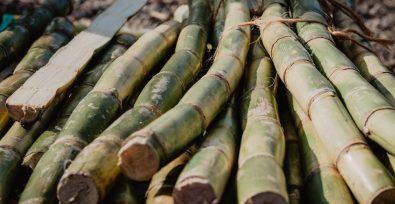India holds the distinction of being one of the world’s largest sugar producers and ranks second in global sugar exports, earning $4 billion every year from sugar alone. But a bitter truth lurks at the bottom of the supply chain. Oxfam reports that almost 200,000 children under 14 work in the hazardous Indian sugar cane industry. Children as young as six are harvesting sugar cane in Maharashtra and, by age 11, are working full time.
Given that millions of sugarcane workers are tricked into debt and forced to work, trafficking risks are high for adults and even more so for children.
Millions of unprotected child workers in Indian sugar industry
Haziq Qadri at Vice reports,
According to government data, there are 50 million farm workers cultivating sugarcane across the country and some sample studies suggest a third of those workers are children.
According to Dhananjay Tingal, the executive director of child rights movement, Bachpan Bachao Andolan, his team found children working in sugarcane fields in previous studies. “In Maharashtra, children are being trafficked from Rajasthan and other parts of India to work in the sugarcane fields,” Tingal said.
The data on child workers in India varies widely. According to UNICEF, there are over 10.2 million children between the ages of 5-14 working in India. Local child rights organisations put the number of child workers closer to 60 million.
Trafficked teens tricked, beaten to work
A 13-year-old and his friends were duped by a labor contractor promising them around $61 a month and new phones to work part-time in their village. However, he ended up taking them hundreds of miles away from home, handing them over to another contractor in a village in Maharashtra.
Working conditions in the fields are harsh without access to shade in extreme heat, sleeping accommodations, enough food to eat, clean water, toilets, or electricity. For these teens, and many other children, abuse awaits if they attempt to leave.
“We were made to work in the sugarcane fields from 5 a.m. until 6 p.m.,” the teen told VICE News. They were never paid and were beaten when they asked to return home.
No government support
Tangade is adamant that, “The government should constitute a welfare board for the financial security and improvement of the standard of living of sugarcane workers rescued from bonded [labour].”
Although some children are rescued from sugar cane trafficking, most are not. Like the U.S. agricultural sector, few to no government protections exist for children working in sugar even though India could not rake in as much profit as it does were it not for their child laborers.
For the time being, non-profits are doing what they can to rescue and rehabilitate children but their resources and influence are limited without government support.





Freedom United is interested in hearing from our community and welcomes relevant, informed comments, advice, and insights that advance the conversation around our campaigns and advocacy. We value inclusivity and respect within our community. To be approved, your comments should be civil.
Hi Elaine! Thanks for your question. As individuals, changing our shopping choices, even stopping buying certain products altogether can feel like the most effective response. But individual boycotts aren’t always the most effective way to tackled forced labor in supply chains. Check out our webinar on this issue which I hope will help provide you with an answer!
https://www.youtube.com/watch?v=3B1X_a5ze9c
Not sure about the accuracy. Anyways. Writing to PMO can help.
Are there ways of tracking whether sugar comes from child labour or slavery, or not? Can we boycott brands and would this be effective?
The Government employees may be bribed not to stop these acts.